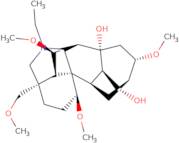hasmanine
CAS: 5066-78-4
Rif. 3D-FH73902
| 5mg | Fuori produzione | ||
| 10mg | Fuori produzione | ||
| 25mg | Fuori produzione | ||
| 50mg | Fuori produzione | ||
| 100mg | Fuori produzione |
Informazioni sul prodotto
- (1alpha,6alpha,14alpha,16beta)-20-Ethyl-1,6,16-trimethoxy-4-(methoxymethyl)aconitane-8,14-diol
- (1α,6α,14α,16β)-20-Ethyl-1,6,16-trimethoxy-4-(methoxymethyl)aconitane-8,14-diol
- Aconitane-8,14-Diol, 20-Ethyl-1,6,16-Trimethoxy-4-(Methoxymethyl)-, (1Alpha,6Alpha,14Alpha,16Beta)-
- Aconitane-8,14-diol, 20-ethyl-1,6,16-trimethoxy-4-(methoxymethyl)-, (1α,6α,14α,16β)-
- Chasmanin
- Chasmanine
- Talitasamine
- Toroko Base II
Hasmanine is a biodegradable organic solvent that is used in the manufacture of pharmaceuticals, dyes, and other chemical products. It can be used as a replacement for methyl alcohol or pentobarbital sodium, which are not biodegradable. Hasmanine is stable at room temperature and has the ability to dissolve many substances. It also has a low boiling point, making it easy to evaporate. Hasmanine is colorless when it's decolorized with trifluoride or gomisin. The most common form of this substance is the sodium salt. Hasmanine is also found naturally in some plants and herbs as methyl alcohol or pentobarbital sodium salt. The main component of this product is menthol, which gives it its minty odor. Recycling this substance reduces waste and pollution.





